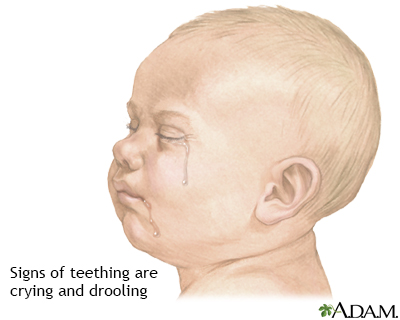Teething
Eruption of primary teeth; Well child care - teething
Teething is the growth of teeth through the gums in the mouth of infants and young children.
Images



I Would Like to Learn About:
Information
Teething generally begins when a child is between 6 and 8 months old. All 20 baby teeth should be in place by the time a child is 30 months old. Some children do not show any teeth until much later than 8 months, but this is usually normal for the child and not due to a disease.
- The two bottom front teeth (lower incisors) often come in first.
- Next to grow in are usually the two top front teeth (upper incisors).
- Then the other incisors, lower and upper molars, canines, and finally the upper and lower lateral molars come in.
The signs of teething are:
- Acting cranky or irritable
- Biting or chewing on hard objects
- Drooling, which may often begin before teething starts
- Gum swelling and tenderness
- Refusing food
- Sleeping problems
Teething does not cause fever or diarrhea. If your child develops a fever or diarrhea and you are worried about it, talk to your health care provider.
Tips to ease your child's teething discomfort:
- Wipe your child's face with a cloth to remove the drool and prevent a rash.
- Give your child a cool object to chew on, such as a firm rubber teething ring or a cold apple. Avoid liquid-filled teething rings, or any plastic objects that might break.
- Gently rub the gums with a cool, wet washcloth, or (until the teeth are right near the surface) a clean finger. You may place the wet washcloth in the freezer first, but wash it before using it again.
- Feed your child cool, soft foods such as applesauce or yogurt (if your child is eating solids).
- Use a bottle, if it seems to help, but only fill it with water. Formula, milk, or juice can all cause tooth decay.
You can buy the following medicines and remedies at the drug store:
- Acetaminophen (Tylenol and others) or ibuprofen can help when your child is very cranky or uncomfortable.
- If your child is 2 years or older, teething gels and preparations rubbed on the gums may help the pain for a short while. Be careful not to use too much. Do not use these remedies if your child is younger than 2 years old.
Be sure to read and follow package instructions before using any medicine or remedy. If you are not sure how to use it, call your child's provider.
What not to do:
- Do not tie a teething ring or any other object around your child's neck.
- Do not place anything frozen against your child's gums.
- Never cut the gums to help a tooth grow in, because this can lead to infection.
- Avoid teething powders.
- Never give your child aspirin or place it against the gums or teeth.
- Do not rub alcohol on your child's gums.
- Do not use homeopathic remedies. They may contain ingredients that are not safe for infants.
References
American Academy of Pediatrics website. Teething: 4 to 7 months. www.healthychildren.org/English/ages-stages/baby/teething-tooth-care/Pages/Teething-4-to-7-Months.aspx. Updated October 6, 2016. Accessed November 29, 2022.
American Academy of Pediatric Dentistry. Policy on oral health care programs for infants, children, adolescents, and individuals with special health care needs. The Reference Manual of Pediatric Dentistry. Chicago, IL: American Academy of Pediatric Dentistry; 2020:39-42. www.aapd.org/globalassets/media/policies_guidelines/p_oralhealthcareprog.pdf. Updated 2020. Accessed November 29, 2022.
Turner EG, Dean JA. Eruption of the teeth: local, systemic, and congenital factors that influence the process. In: Dean JA, ed. McDonald and Avery's Dentistry for the Child and Adolescent. 11th ed. St Louis, MO: Elsevier; 2022:chap 20.
BACK TO TOPReview Date: 10/31/2022
Reviewed By: Neil K. Kaneshiro, MD, MHA, Clinical Professor of Pediatrics, University of Washington School of Medicine, Seattle, WA. Also reviewed by David C. Dugdale, MD, Medical Director, Brenda Conaway, Editorial Director, and the A.D.A.M. Editorial team.

Health Content Provider
06/01/2025
|
A.D.A.M., Inc. is accredited by URAC, for Health Content Provider (www.urac.org). URAC's accreditation program is an independent audit to verify that A.D.A.M. follows rigorous standards of quality and accountability. A.D.A.M. is among the first to achieve this important distinction for online health information and services. Learn more about A.D.A.M.'s editorial policy, editorial process and privacy policy. A.D.A.M. is also a founding member of Hi-Ethics. This site complied with the HONcode standard for trustworthy health information from 1995 to 2022, after which HON (Health On the Net, a not-for-profit organization that promoted transparent and reliable health information online) was discontinued. |
The information provided herein should not be used during any medical emergency or for the diagnosis or treatment of any medical condition. A licensed medical professional should be consulted for diagnosis and treatment of any and all medical conditions. Links to other sites are provided for information only -- they do not constitute endorsements of those other sites. © 1997- 2024 A.D.A.M., a business unit of Ebix, Inc. Any duplication or distribution of the information contained herein is strictly prohibited.
